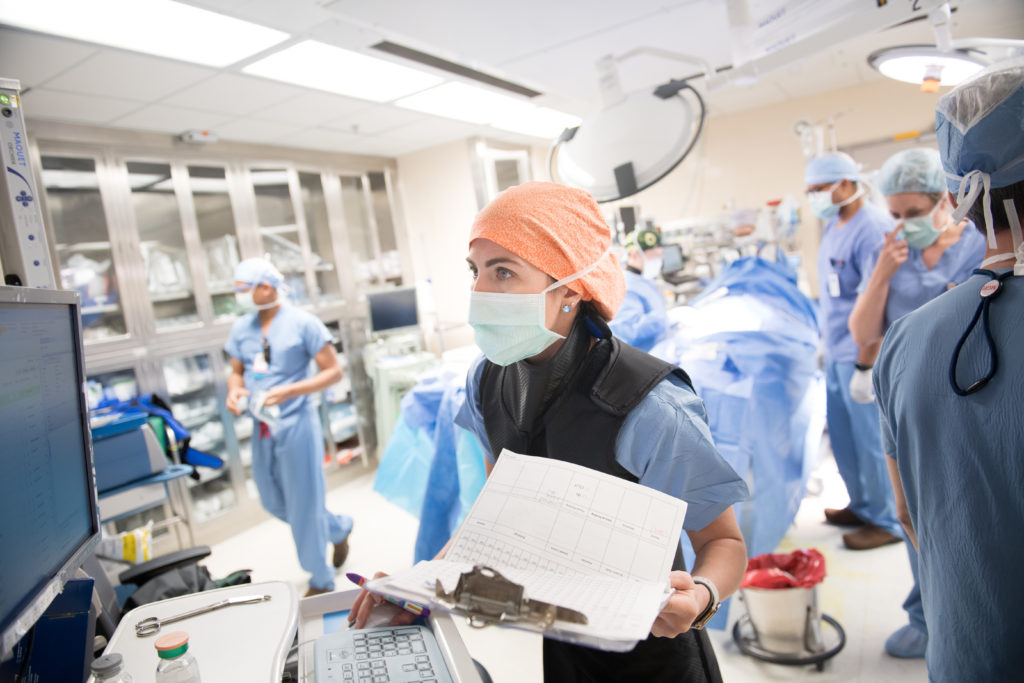How might Massachusetts General Hospital’s ongoing efforts to transform patient care impact the national opioid epidemic?
Haytham Kaafarani, MD, MPH, is putting one innovative strategy to the test. As the director of the Center for Outcomes & Patient Safety in Surgery (COMPASS) at Mass General, he is dedicated to improving surgery outcomes and ensuring patients can resume their normal lives as quickly as possible.
“What we need to do is come together across departments and harmonize our efforts, share best practices and scale up successes.”
Dr. Kaafarani recently launched COMPASS with the support of Mass General leadership, the Mass General Physicians Organization (MGPO) with the executive sponsorship of Tim Ferris, MD, CEO of the MGPO. The interdisciplinary COMPASS team of faculty and staff is working to develop new quality and safety standards based on more effective data collection and analysis.
Scaling Up Patient Care Successes
By taking this approach, COMPASS seeks to identify and highlight care techniques that best help patients get home quickly and safely after surgery and enjoy a high quality of life. “What we need to do is come together across departments and harmonize our efforts, share best practices and scale up successes,” Dr. Kaafarani says. “We are focused on ensuring we have data that will help us measure if Mass General patients are receiving the appropriate surgery in the most efficient manner with the best outcomes. Our goal is to be the undisputed leader in surgical outcomes.”
For COMPASS, electronic medical records are an important tool since they contain a wealth of information about diagnoses, treatment and results. Powerful computer technology makes it possible to gather and compare the individual data points within health records like never before. Such “machine learning” can help caregivers and researchers determine what treatments are likely to work best for patients with similar symptoms.
“The goal is to better ensure an individual is receiving the right procedure at the right time, with the best possible outcome, every time,” says Dr. Kaafarani, who is supporting Mass General’s commitment to building healthier communities.

•Oncology Nurse Residency Program Deepens Cancer Care
• Smartphones May Bolster Post-Operative Recovery
• Health Care Education: Pursuing the New Frontier
Being Part of the Solution
Before formally establishing COMPASS, Dr. Kaafarani focused on the opioid issue because drugs prescribed for pain management after surgery often end up in the hands of people other than patients. Such diversion suggests the drugs might not have been needed for their intended purpose. It also contributes to the national opioid epidemic.
“As surgeons and caregivers, we don’t want to be part of the problem,” Dr. Kaafarani says. “We want to be part of the solution.”
To investigate, the team reviewed prescription histories for 42 of the most common surgical procedures across 11 divisions within the hospital. They found startling variability, sometimes for the same surgical procedures. For example, for patients undergoing removal of their gallbladder, the range of opioid pills prescribed ranged between 0 and 56 pills.
The team then met with quality directors across 11 divisions to find consensus on more appropriate prescription amounts. In addition to reducing the number of opioids prescribed, the participants discussed recommending alternatives to opioids, including acetaminophen and non-steroidal anti-inflammatory drugs.
The team also created a brochure to educate patients on expectations around post-surgery pain and a poster to help physicians talk with their patients about strategies to manage pain after surgery. In addition, Dr. Kaafarani and his team led seminars for physicians, residents and nurses to ensure everyone was informed.
The impact was remarkable. During a 12-month monitoring period, the number of opioid prescriptions fell by up to 50 percent.
Opioid Prescriptions Decline
The impact was remarkable. During a 12-month monitoring period, the number of opioid prescriptions fell by up to 50 percent. Refills held steady and prescription disparities related to gender and race were eliminated.
“We are in the early days of this work,” Dr. Kaafarani says. “But participants are eager to collaborate on other projects that can improve the health outcomes and safety of our patients.”
Equally important, the COMPASS team is also employing Patient Reported Outcomes Measures to ensure the voices of patients are heard and their values are met, improving the patient experience and patient satisfaction.
Dr. Kaafarani believes that, with philanthropic support, data-driven initiatives like COMPASS can lay the groundwork for revolutionary results as Mass General shapes the future of health care. “Mass General is determined to move from a defensive position to an offensive position and create a model for the best and safest standards of care other institutions can emulate,” he says.
To learn more about how you can support initiatives like COMPASS and help transform patient care, please contact us.


